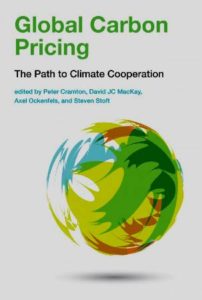Toward a Science of Economics
The Path to Climate Cooperation
 As a co-editor of Global Carbon Pricing (MIT, 2017, $35 or free PDF), I’m currently focused on international climate cooperation. This could be facilitated by a common reciprocal agreement (I will if you will).
As a co-editor of Global Carbon Pricing (MIT, 2017, $35 or free PDF), I’m currently focused on international climate cooperation. This could be facilitated by a common reciprocal agreement (I will if you will).
To demonstrate this and gain attention for this approach, I am currently planning a series of online behavioral experiments using LIONESS Lab at the U. of Nottingham for the programming, and Prolific as my source of participants.
These will only involve a small number of players, but a robust climate agreement needs to begin with a crucial step—a stable agreement among a small core of large players, e.g. the EU, US, China, and perhaps, India. That agreement will attract others who voluntarily comply without joining the core agreement. Then the core players can implement incentive mechanisms to induce reluctant countries to join in.
Science
Neoclassical (standard) economics has its uses. But when applied to macroeconomic bubbles, the source of consumer preferences, negotiations, prejudice or discrimination, unemployment, etc. standard economics often fails dramatically.
Aside from the complexity of these problems, the chief causes of failure are the unscientific economic assumptions regarding:
- human rationality,
- the absolute incomparability of individual utilities, and
- sociopathic preferences.
Consider preferences. The neoclassical assumption is that these are determined by utility (happiness) functions that include only personal consumption. If people have even the common desire to “keep up with the Joneses,” let alone the Kardashians, the most fundamental, triple-Nobel-Prize-winning theorem fails to apply to human society. It’s just math, not science. (Fortunately, newer economics is becoming more scientific, see, e.g., Esther Duflo. And economic engineering is gaining steam, e.g., Al Roth’s system of kidney exchanges.)
Sociopathic Preferences?
Economists call them “rational” preferences and there’s some sense to that, but it makes them sound desirable. But the fact is, these preferences rule out having a conscience. And those having one is irrational, it’s what makes us human and human society possible. It’s what a sociopath is missing. But my point is not that economist are advocating sociopath behavior, rather it’s that assuming, humans are basically sociopaths misses too much. It not a scientific assumption. It’s an assumption made to simplify economic theory and produce nice math theorems.
The “rational” preferences, assumed by essentially all of economics and game theory, rule out carrying about society in either a positive way (concern for the environment or the well-being of others) or a negative way (envy, schadenfreude, or delight in causing misery). Although, true sociopaths experience some of these feelings in an attenuated form, the essence of the condition is a nearly completely focus on one’s own preferences and a lack of empathy. This fits the economic definition of “rational” preferences almost perfectly.
Without social preferences, we would probably live an asocial existence like turtles — if that were possible. Besides attempting a scientific approach to understanding and guiding climate cooperation, I hope someday to write a short book exposing the inadvertent deceptions that plague undergraduate economics texts. Even a little science could add a great deal of realism to basic economic theory as taught in most colleges and universities.
Most Recent Blog Posts:
Texas: The Energy-Only Bias
So far, no electricity market is able to completely avoid blackouts due to insufficient capacity. That means some mechanism must decide the extent of blackouts that will be accepted. There are two ways to control the quantity of capacity the market will build — by regulating prices or by regulating

Frozen: Electric Blackouts inTexas
Massive blackouts in TX raise two questions: Was in wind — does climate policy threaten America? And was it free-wheeling TX regulation?